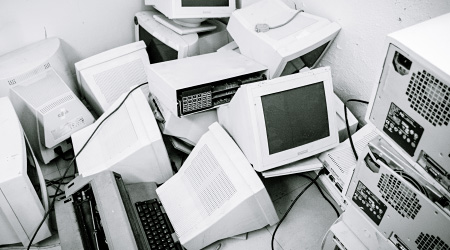Small Business Equipment Leasing

Many small business owners struggle with the decision of whether to purchase business equipment outright or lease instead. There are pluses and minuses to both options but inevitably financial constraints such as cash flows make many small businesses lean towards leasing their equipment. This is especially true for certain types of equipment like phone systems, production tools, heavy machinery and office furniture. The following five factors can assist you in evaluating leasing as an option for your small business equipment.
Effect On Cash Flow
Small businesses continually struggle with balancing cash inflows and outflows. Revenues from sales are often erratic and unpredictable while bills to suppliers tend to be fairly consistent. A fixed low monthly payment for leasing small business equipment is often more beneficial than taking out a loan or saving for months to purchase equipment outright. This is especially true if you need expensive equipment today but don't have the funds to make a purchase.
No Large Down Payment
Even on sizable purchases, which may include a payment plan, there is normally an large initial down payment. If your small business is purchasing $20,000 worth of servers and other computer equipment then the initial down payment could be as much is $4,000. Leasing allows you to get the same amount and quality of equipment but without the initial down payment. This is because leases are contract based and are normally penalties and fees if a lease is ended early. This protects the company leasing the equipment by guaranteeing monthly revenue for a period of years.
Lease Conclusion
Purchasing small business equipment initially allows business owners to depreciate the asset's value over a period of years. Leasing however, has multiple purchasing options when a lease term is up such as buying the equipment for one dollar, 10% of its value, fair market value or renew the lease at a reduced rate. Each of these options are normally spelled out in the leasing documentation and provide a small business owner the opportunity to purchase the equipment if they so choose.
Tax Advantages
Lease payments for small business equipment are considered an operating expense which will reduce the total net revenue of your business and lowering your tax burden. Depreciation may be more beneficial depending on your business structure and other factors. Consult with a certified public accountant or tax attorney to determine whether leasing or purchasing is the most appropriate course of action for your small business.
The Bottom Line
Leasing small business office equipment is similar to leasing a vehicle for individuals. At the end of the day, do you want to own a piece of equipment in perpetuity until it is either discarded or sold as used. Many small businesses want to use equipment for a certain period of time and then either upgrade to newer equipment or change to something completely different. Leasing provides the flexibility to change your mind or alter your business practices 3 to 5 years in the future without being concerned about disposal of pre-existing equipment. Whether leasing equipment is appropriate for you will depend on your business, customers, taxes and your general feelings about leasing versus purchasing.







